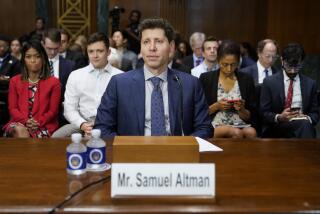A foreigner tapped to lead Japanese firm Olympus exposes a scandal
- Share via
When Michael Woodford in 2011 became president of Olympus Corp., the Japanese optical equipment maker, he told his secretary there was no need to walk backward each time she left his office. In the executive suite of a Japanese company, where fawning deference to those at the top is the norm, this counted as a radical egalitarian gesture.
But, as Woodford discovered, he was not really at the top at all.
Although he had been promoted to the presidency, becoming the first foreigner to assume that role since the company was established in 1919, he was kept out of the inner circle. Tsuyoshi Kikukawa, the man who appointed him, stayed on as chairman and took on the new title of chief executive, until this title was given to Woodford six months later.
The outward appearance was that the Englishman was running the show. He flew first-class and stayed in the best hotels, perks he clearly enjoyed and that he missed after he was sacked, most comically when he was forced to take a yellow cab — of all things — after landing in New York.
The truth , however, was that he was just window dressing, not a true member of the inner club.
Woodford’s account of how he became Japan’s most notorious corporate whistle-blower — he prefers the more sonorous-sounding “bell-ringer” — is told in his much-awaited book from Portfolio, “Exposure: Inside the Olympus Scandal: How I Went from CEO to Whistleblower.”
In it he relates, at John Grisham-like pace, how he stumbled upon a $1.7-billion fraud that he — unlike his fellow board members — refused to hide.
Woodford’s appointment as president had come on April Fool’s Day 2011. Within just a few months it was he who felt the fool.
In July, Facta, an obscure Japanese financial magazine, alleged wrongdoing at the company. Its article said Olympus had bought three obscure companies — one of which made face cream and another microwave dishes, unlikely purchases for a high-tech business known for dominating the endoscope market — at what seemed like an exorbitant price.
When Woodford pressed his board to investigate, he received short shrift. When he launched his own investigation and brought in external auditors, he was fired.
The ostensible reason was that, as a foreigner, he had failed to adapt to Japanese corporate culture. In a way, that was true. The scandal that Woodford was about to expose dated back to the late 1980s, when executives placed large bets on speculative investments.
This was at the height of the Japanese bubble brought on, partly, by the Plaza Accord of 1985, in which the country had been pressed by France, Germany, the U.S. and Britain to appreciate the yen. That wrecked the profitability of many exporters, including Olympus.
Emboldened by low interest rates, brought in to offset the effect of the high yen, many companies went on a buying spree, snapping up property, equity and other financial instruments. When the market crashed in 1990, some companies were left with huge unrealized losses. The strategy of many was to wait patiently for the markets to recover. They are still waiting.
In Olympus’ case, the losses sat there until accounting changes introduced in the late 1990s threatened to expose them by forcing the company to place a market value on financial assets. It was at this point that executives hit upon a complex scheme to make the losses “vanish” by selling them to fake funds at book value.
Later, to reimburse the shady financiers who ran them, cash was funneled to these funds by overpaying for what Woodford calls the three “Mickey Mouse companies” and by paying ludicrously generous advisors’ fees.
There is no evidence that the complex subterfuge was undertaken for personal gain. Rather, in what Woodford calls the “Alice in Wonderland logic” that still guides many Japanese boardrooms, it was to protect the company and maintain the honor of its management, past and present.
It is conceivable that, had Facta never published its article and Woodford not acted, Olympus’ losses would still be secret. In the weeks after his revelations, shares in the company fell more than 80%.
Woodford’s book might have benefited from at least a nod to the multiple failings of corporate governance in other countries, with their excessive pay and perverse incentives.
Undertaking crazy schemes to hide losses is not unique to Japan, as many Western banks have been forced to reveal. Yet in the case of Olympus, losses weren’t produced by rogue traders whose excesses its risk-management systems failed to detect. Those responsible for the gambles and the coverup were to be found in the inner sanctum of the boardroom.
Woodford is not the first to find that “things are very different in Japan from elsewhere in the world of business.” But he is one of the few foreign business executives to have penetrated deep inside a Japanese corporation and to report back unflinchingly on what he saw.
What he found was not pretty.
Pilling is the Asia editor for the Financial Times of London, in which this review first appeared.
More to Read
Inside the business of entertainment
The Wide Shot brings you news, analysis and insights on everything from streaming wars to production — and what it all means for the future.
You may occasionally receive promotional content from the Los Angeles Times.










